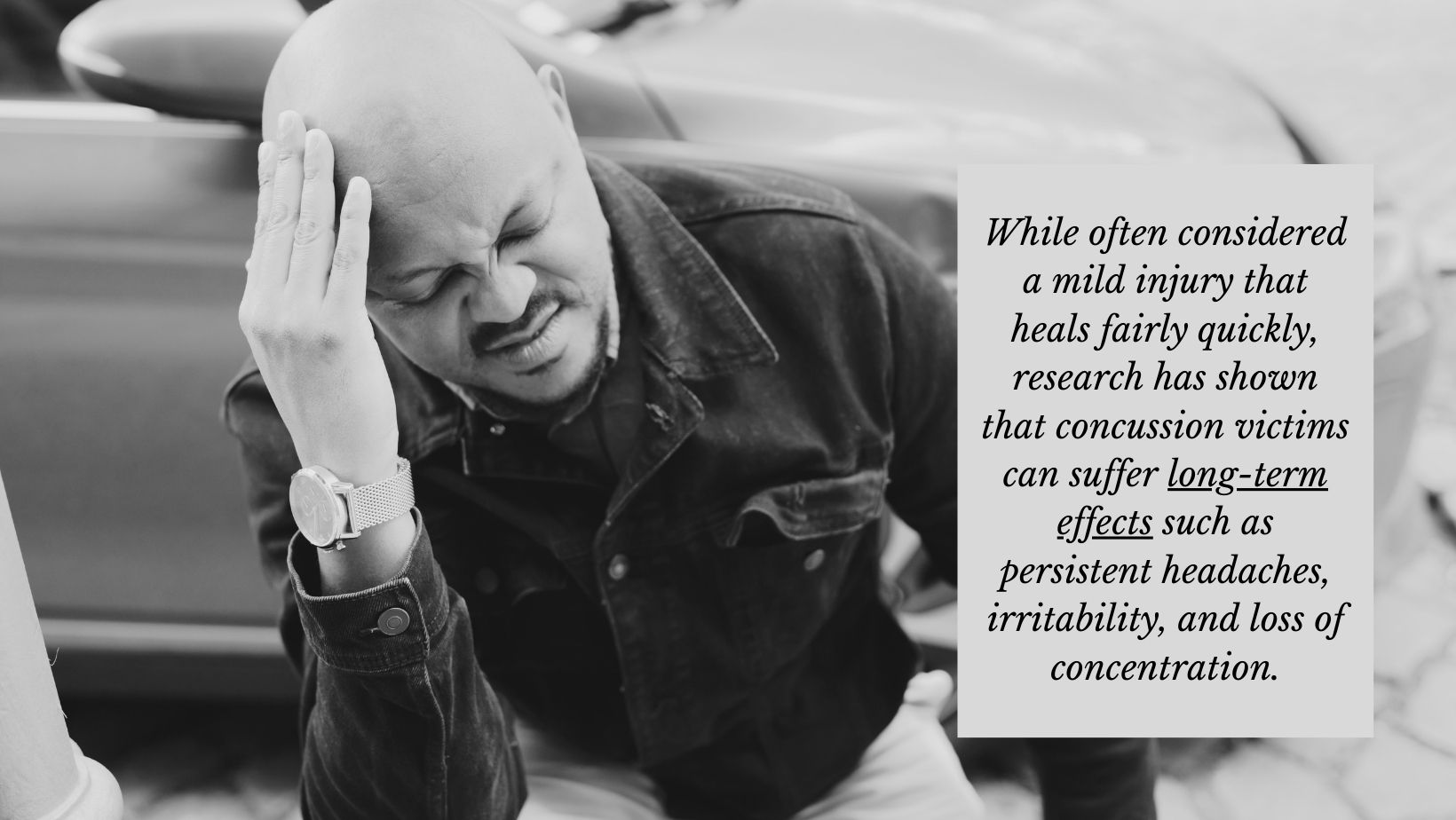Being in an auto accident is always traumatic, but can take an even bigger toll when injuries involve the brain. Traumatic brain injury (TBI) victims may experience physical pain such as headaches as well as cognitive issues including confusion, memory loss, and behavior changes. Rehabilitation can take from weeks to months after the crash.
If a sudden-impact auto accident caused a blow or jolt to your head, it’s important to evaluate your symptoms to rule out a brain injury. You may need to seek medical attention, and begin speaking with a personal injury attorney who can recover costs for your treatment.
Common Brain Injuries Sustained in Auto Accidents
Not every accident is the same, and neither are the injuries they cause. Minor accidents and fender benders might result in light bruising on the brain while major collisions can cause severe hemorrhaging. Examples of common traumatic brain injuries include:
Concussions
A bump or jolt to the head, such as with a deployed airbag, can cause the brain to move back and forth quickly. This can stretch and change the shape of brain tissue and damage brain cells.
While often considered a mild injury that heals fairly quickly, research has shown that concussion victims can suffer long-term effects such as persistent headaches, irritability, and loss of concentration.
Contusions
A contusion, also known as a brain bruise, can happen with a rear-end, head-on, and side-impact collision. A CT scan will reveal swelling in the brain in the area that was struck. A second contusion, called a coup-contrecoup, may also result on the opposite side of the brain where the brain bounced off of the skull.
Diffuse Axonal Injuries (DAI)
Collisions that cause violent rotational, forward, or backward movement can result in this type of brain damage. Tiny thread-like connectors called axons connect neurons and cells in the brain, and when those axons tear due to the force of an auto accident, brain function diminishes.
Hematoma
A severe accident can lead to a blood clot, and surgical removal of the clot is often necessary. There are three types of hematomas:
- Epidural: Outside of the brain
- Intracerebral: In the brain
- Subdural: Between the brain and the dura mater, which is the thick, strong outer membrane layer directly under the skull
Hemorrhage
Bleeding in the brain or in the dura mater reduces delivery of oxygen-rich blood to areas of the brain, so it requires surgical intervention. The four primary types of brain hemorrhages are:
- Epidural: Between the inside of the skull and the dura mater
- Intraparenchymal: Inside the brain
- Subarachnoid: Inside of the arachnoid membrane
- Subdural: Between the dura mater and the arachnoid membrane

Signs and Symptoms of a Traumatic Brain Injury
It’s not always easy to tell if an auto accident has affected the brain. Some signs, such as headaches and irritability, can be mistaken for symptoms experienced even before the collision. And symptoms of a TBI don’t always show up immediately after an auto accident. They can appear days, weeks, or even months later. It’s important to recognize what to look for after hitting your head, even if it’s been a while since the accident.
Symptoms of a mild TBI can include one or more of the following:
- Headache
- Dizziness
- Blurred vision
- Nausea or vomiting
- Ringing in the ears
- Sensitivity to light or sound
- Confusion
- Tiredness or sleepiness
- A change in sleep habits
- Behavior changes (moodiness)
- Trouble concentrating or remembering things
- Loss of consciousness, from a few seconds to minutes
Symptoms of a moderate to severe TBI include:
- Persistent headache that gets worse
- Loss of vision in one or both eyes
- Repeated vomiting or continued nausea
- Slurred speech
- Seizures
- Not being able to wake up
- Enlarged pupil in one or both eyes
- Numbness or tingling of arms or legs
- Clumsy movements and/or loss of motor function
- Increased agitation
- Increased confusion
- Loss of long-term memory
- Speech and language difficulties
- Loss of consciousness lasting minutes to hours
Even if you are not certain your symptoms indicate a traumatic brain injury, it’s always best to seek medical attention after head trauma. Experts at the Mayo Clinic say TBIs vary widely in terms of severity, and symptoms might not be obvious until a healthcare provider can make a diagnosis and run tests.
Seeing a doctor as soon as possible after the accident is also important for winning a traumatic brain injury settlement, as it can show that you did not worsen your condition by waiting too long to seek treatment.
Rehabilitation for Traumatic Brain Injuries
Because the severity of brain injuries can range from mild to severe, every patient will have a different recovery and rehabilitation plan. Those with mild cases will be able to rest for a couple weeks and get back to work, but others may take longer to regain the knowledge and skills they had before. And some may need to adapt to lifelong changes.
Treatment for mild to moderate TBIs may include:
- Physical therapy to build strength, balance, and flexibility.
- Cognitive therapy to improve memory, attention, learning, and judgment.
- Speech therapy to improve communication skills.
Treatment for severe TBIs may include:
- Occupational therapy to relearn daily tasks like bathing, cooking, and getting dressed.
- Psychological counseling for help coping with life changes. This may include medications for anxiety and depression.
Some TBI patients never fully recover, and may require the help of an aide or moving to a permanent care facility.
A Traumatic Brain Injury Settlement Can Get You the Compensation You Deserve
Whether you’ve had to take a short time off of work or your life has changed forever, you deserve to be compensated for an accident that was not your fault. Our personal injury attorneys will do everything we can to recover not only the costs of your medical bills and lost wages, but also the pain and suffering that could affect your life for years to come.
In New Mexico, the statute of limitations to file a personal injury claim is three years, so don’t wait any longer. Contact us online or at 575-449-3673 for a free consultation, and we will give you our honest, professional opinion about your case.
Please note that this article was created for advertisement purposes, and it does not constitute any contractual legal relationship, nor imply one.
